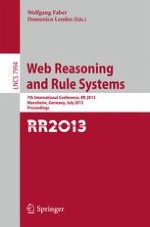This book constitutes the refereed proceedings of the 7th International Conference on Web Reasoning and Rule Systems, RR 2013, held in Manheim, Germany in July 2013. The 19 revised research papers and 4 technical communications presented together with 2 invited talks and 1 tutorial talk were carefully reviewed and selected from 34 submissions. The scope of conference is decision making, planning, and intelligent agents, reasoning, machine learning, knowledge extraction and IR technologies, large-scale data management and reasoning on the web of data, data integration, dataspaces and ontology-based data access, non-standard reasoning, algorithms for distributed, parallelized, and scalable reasoning, and system descriptions and experimentation.
